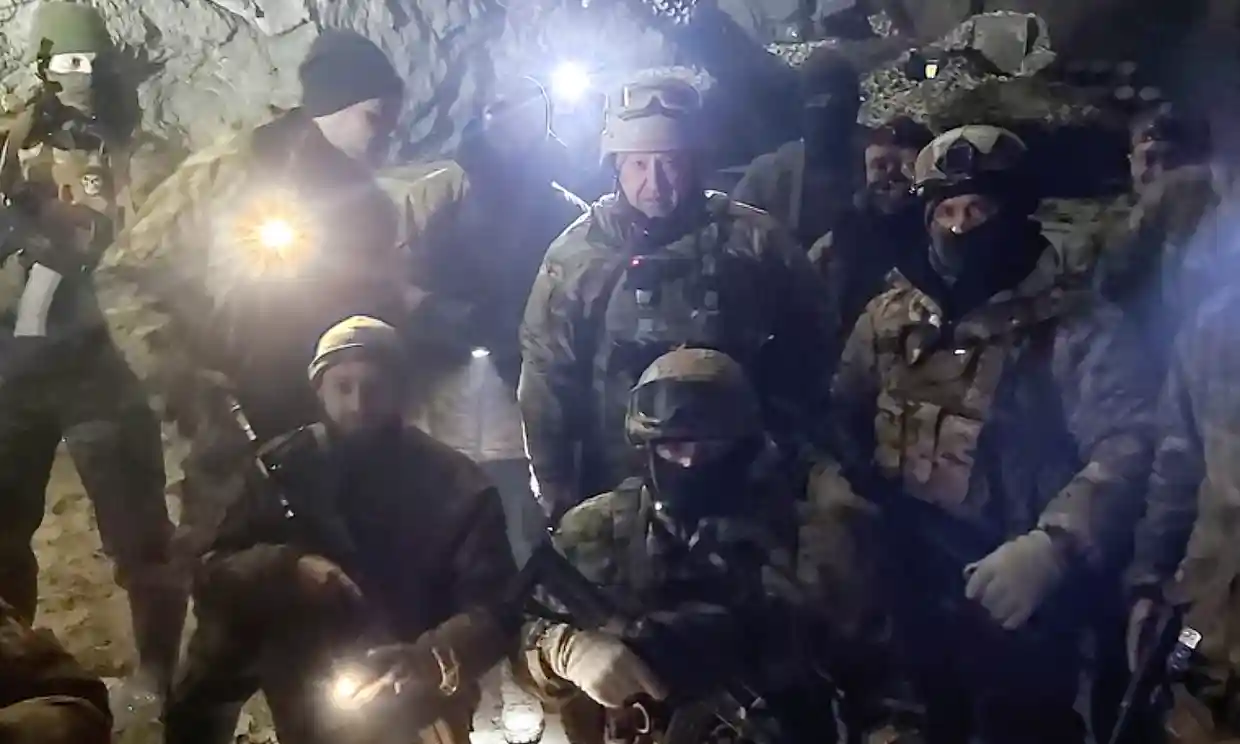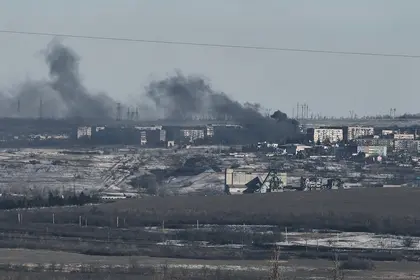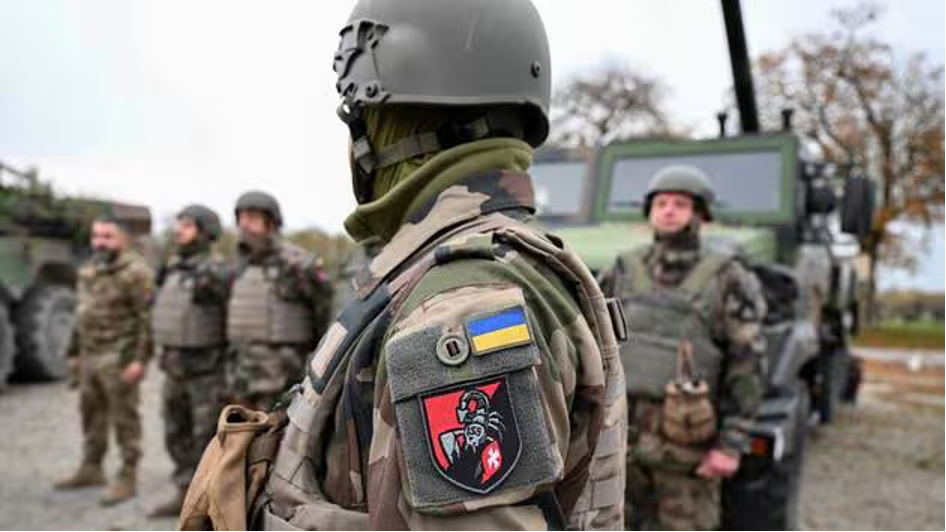The Armed Forces of Ukraine (AFU) appear to still be fighting in Ukraine’s eastern city of Soledar. They are reportedly battling to hold the city’s central district and supply routes to the west and south, contradicting the Kremlin’s claims that Ukrainian forces in the sector had been killed, surrounded or put to flight.
JOIN US ON TELEGRAM
Follow our coverage of the war on the @Kyivpost_official.
The weight of reports seems to confirm that an assortment of Ukrainian infantry and artillery units built around the AFU’s 46th Mechanized Infantry Brigade are holding a coherent defensive line among ruined buildings and streets in the industrial Donbas city. They are understood to be withstanding assaults from regular Russian army units and Moscow-hired mercenaries from the Wagner Group.
Wagner head Yevgeny Prigozhin, in a Jan 10. statement, claimed his fighters had taken almost total control of Soledar, though some “urban battles” were still being fought.
“Wagner units have taken control of the whole territory of Soledar,” Prigozhin said in an audio message posted on Telegram. “A cauldron [encirclement] has been formed in the center of the city in which urban fighting is going on. The number of prisoners taken will be announced tomorrow [Wednesday].”
In response, official Ukrainian sources flatly denied that Kyiv’s troops had been surrounded, saying Ukrainian defenses were fully capable and that combat was still in progress. A spokesman for the Eastern Group of the AFU, Serhii Cherevaty, told the Suspilno news platform: “The Russians say that Soledar is under their control – this is not true.”

ISW Russian Offensive Campaign Assessment, December, 17, 2024
Referring to a photograph published by Prigozhin on Tuesday evening as evidence of Wagner’s purported battlefield success, Cherevaty said: “It seems that Prigozhin’s location does not correspond to reality, and he is not in the Soledar mines. He added that the announcement was likely a PR exercise aimed at the internal [Russian domestic] audience to “somehow justify the insane losses among the felons [hired by Wagner].”

The picture Prigozhin posted to Telegram, purportedly showing him in the mines below Soledar.
Prigozhin, as part of his Jan. 10 statement, published a photograph showing him standing in military uniform in a salt mine, surrounded by posing fighters. He did not say where the picture was taken. Russian state news agency RIA Novosti published another photograph of Prigozhin with armed fighters, saying it was taken in the salt mines of Soledar.
Internet users across Ukraine were quick to rubbish the image as supposedly proving Wagner mercenaries’ capture of Soledar, with most platforms geolocating the photograph to a salt mine in the eastern outskirts of the city, far from Ukrainian positions and well within Russian lines.
Independent observers appeared to support the Ukrainian army’s declaration that its troops were still fighting and Russian forces had captured only part of the city; furthermore that Prigozhin’s claims were exaggerated or invented.
Soledar pictured on Wednesday. Credit – Kostiantyn and Vlada Liberov.
Yury Butusov, a high profile independent Ukrainian war correspondent, reported from inside Soledar in a Jan. 11 morning Facebook post: “Russian channels are spreading disinformation about the situation at the front. There are no encirclements of our troops.”
The Kremlin said on Jan. 10 that it was important not to “rush” to declare victory in Soledar, hours after the Wagner group claimed it had seized control of the city.
“Let’s not rush. Let’s wait for official announcements,” Kremlin spokesman Dmitry Peskov said, adding that there was a “positive dynamic in advances” in Soledar and saluted the “heroism of our fighters.”
“Tactical successes, of course, are very important,” he added.
Russia’s Defense Ministry in a Jan. 10 morning statement said fighting inside the city “was continuing” and that Russian forces were being backed with air strikes.
The Washington-based Institute for the Study of War (ISW) also downplayed Prigozhin’s claims of victory in Soledar, stating in its Jan 10. situation estimate: “Russian forces have not captured the entirety of Soledar despite several false Russian claims that the city has fallen and that [the larger city to the south] Bakhmut risks imminent encirclement.”
Soledar pictured on Wednesday. Credit – Kostiantyn and Vlada Liberov.
“The reality of block-by-block control of terrain in Soledar is obfuscated by the dynamic nature of urban combat, however, and Russian forces have largely struggled to make significant tactical gains in the Soledar area for months,” the statement said.
Shift in Russia’s focus from Bakhmut to Soledar
Soledar is a salt mining city in Ukraine’s eastern Donetsk region, around 15 kilometers (nine miles) from Bakhmut. Russian forces have been trying, unsuccessfully, to seize it for months.
Since the year began, Russia’s high command appears to have completely given up on direct assaults on Bakhmut, preferring instead to attempt to capture Soledar.
Were Wagner and other Russian units to gain control of Soledar, it would, for Moscow, mark the first major Russian battlefield success for several months.
ISW said Soledar has limited strategic significance and were Russian forces to capture it, a new AFU defense line a few kilometers to the west would be relatively easy for Kyiv to construct.
Ukrainian media and officials have said that the AFU’s main objective in Soledar should be inflicting maximum casualties on Russian forces as they attack. According to Ukraine’s Army General Staff (AGS) Jan. 10 morning situation estimate, over the past 24 hours, Ukrainian troops claim to have killed or captured at least 490 Russian soldiers, with the epicenter of fighting at Soledar.
In a post on Telegram just a few hours before Prigozhin's claim, Deputy Defense Minister Ganna Malyar said “the enemy does not pay attention to the large losses of its personnel and continues to actively storm… The approaches to our positions are simply strewn with the bodies of dead enemy fighters. Our fighters are defending bravely.”
Earlier this week, President Volodymyr Zelensky claimed “the whole land in Soledar is covered with corpses of the invaders,” adding “everything has been completely destroyed.”
Prigozhin has claimed that he wants to seize Soledar and the nearby city of Bakhmut because of the strategic opportunity presented by the cavernous salt mines underneath the area which, pre-war, were used to host concerts and sporting events.
“The cherry on the cake is the system of Soledar and Bakhmut mines, which is actually a network of underground cities,” he said on Telegram on Jan. 7.
“It not only [has the ability to hold] a big group of people at a depth of 80-100 meters, but tanks and infantry fighting vehicles can also move about.”
Prigozhin also claimed the caves hold vast stockpiles of weapons from World War I, but this has been disputed.
U.S. officials believe he’s simply motivated by the potential financial benefit of taking control of the mines, which would be in line with Wagner’s modus operandi in other conflicts it has participated in.
U.S. officials said last week that out of a force of nearly 50,000 Wagner mercenaries, over 4,100 have been killed and 10,000 wounded in Ukraine. Over 1,000 of those killed died between late November and early December near Bakhmut.
Prigozhin said that Soledar has been stormed “exclusively” by Wagner units. According to the Russian Defense Ministry on Jan. 11, Russian army paratrooper units were fighting in the sector as well.
You can also highlight the text and press Ctrl + Enter






